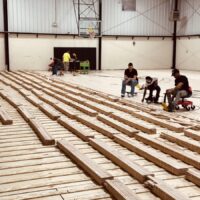Inflation is at a 30-year high in the U.S., and rural households are some of the hardest hit.
“Inflation has hurt lower-income families, families of color, and rural households more than other demographics, a Bank of America research report found last week,” Jason Lalljee reports for Business Insider.
“Breaking down demographics by race, geography, and income, the bank found that the ‘inflation shock’ of 2021 has disproportionately affected the marginalized: Households without college graduates, African American, Hispanic and Latino communities, and those not living in cities have been spending more of their post-tax income on goods and services.”
Rural households are paying an average of 5.2 percent more of their post-tax income because of inflation, compared to 3.5% of metropolitan households.
“All of the high-inflation categories, particularly energy and new and used cars, make up a larger share of the consumption basket for rural households,” researchers wrote. “They also earn and save less than urban households, and so inflation is a bigger drag on their income, and they have less buffer against the shock.”
Inflation has been blamed on everything from corporate greed to President Biden, but it’s mostly a function of reduced supply and increased demand.
The Rural Blog is a publication of the Institute for Rural Journalism and Community Issues based at the University of Kentucky.






